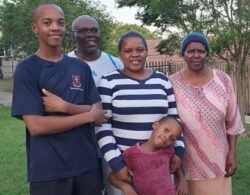Testimony of Conversion
Originally from a poor rural village lacking clean water and electricity, Sipho Mfusi thought he had hit the jackpot as a manager for a global airline catering company until tragedy struck. Sipho was active in the largest African traditional religion in South Africa, which follows strict dietary, moral and ceremonial laws and emphasises salvation by good works, but he admits he was more interested in a soccer career and his well-paying job than God. “For 41 years I wanted to play for top South African club the Kaizer Chiefs,” Sipho shares. “All my affections, satisfaction, pleasures, purpose and significance in life was wrapped up in a game of soccer.” Then he landed a job as a procurement officer for a global airline catering firm and turned to focus on that. In line with his family’s beliefs, Sipho says, “I would look for opportunities to help others in order to accumulate as many ‘points’ as possible which will remind God to help when I find myself facing a severe trial.” However a severe trial showed him that he had wrong beliefs about God. Sipho’s wife died from breast cancer in 2002 and he felt devastated that God had not paid attention to his accumulated “points”. “I fasted and prayed and, in despair, consulted traditional healers, sangomas and inyangas. But her condition deteriorated,” he remembers sadly. After his wife’s death Sipho rejected God and religion and worked to become the operations manager within a year. “I hated God. The need for Him was out the window. The job was my idol: it gave me fulfilment, satisfaction and a sense of purpose and meaning of what life is all about.” Sipho remarried two years later moved to his company’s Sydney office, which had a new contract with Australia’s Qantas airline. On Sundays he enjoyed a beer while watching soccer at a beachside bar but his wife Lungi had a different idea for the day. For months she begged him to attend a small church near their apartment until he gave in. After a warm welcome at this church, Sipho remembers, “The pastor was preaching on the Ten Commandments and pointed out that Jesus was the only one who fulfilled all the requirements of God’s Law. “He said, we can’t do it out of our own strength, no matter how hard we try. Because of God’s holiness and justice, He will judge all who failed to live according to His divine standards. “He added that for all those who have accepted Jesus, God will no longer punish them for their own sin whether committed in the past, present and future. Because Jesus was punished on their behalf when He died on the cross.” This triggered Sipho’s curiosity, as he recalls, “I had never heard that message before.” He began examining the Bible daily, along with other Christian books and online sermons, attending Christian conferences and discussing the Bible for hours with a church friend. “Every sermon, book and conference speaker put the death of Jesus on the cross at the centre. Without Him, humanity is lost and without hope,” Sipho recalls. Two years after they arrived in Sydney the enquiring couple decided to trust Jesus alone for forgiveness and salvation. “In my body it was as though someone had just lifted a very heavy load off my shoulders,” he explains. “God had forgiven me, I am His child because of Jesus’s death in my place. And it’s that work alone which God accepts as a payment for sin, nothing more and nothing less.” Even though he knew he was forgiven Sipho still struggled to believe that Jesus’ death paid for his past, present and future sins. He remembers thinking, “It is just too hard to believe that all my sins committed in the past, stealing, adulterous relationships and lies were simply wiped out because of Jesus death.” A Christian friend then gave him a penetrating perspective, “If you continue to doubt this truth, you are saying that Christ did not suffer enough for you.” Upon accepting God’s total forgiveness, Sipho and Lungi felt a burden to share this good news of Jesus with their people back home in Estcourt, South Africa. At the expiration of his work visa in Sydney, he was transferred to another office in Virginia in the US. In Nov 2010, he eventually resigned from his job to pursue theological training. He graduated with a BTh from George Whitefield College in Nov 2013. He moved back to Estcourt to become a full-time Christian missionary amongst his people groups – Zulu ethnic group and the Zionists. “When I reach the end of my days a moment or two from now, I will consider my earthly existence to have been wasted unless I can recall a loving family, a consistent attempt to serve my Saviour and a meaningful investment into the lives of people. Nothing else makes much sense”.
Call to Ministry
It was God’s provision in bringing us back to Estcourt. In 1984 I moved from Estcourt to Johannesburg where I worked various jobs for 20 years. Towards the end of 2004, my employer relocated us to Australia [where I was saved], moved again at the end of 2007 to the US until November 2010. Moved back to South Africa, spent another 3-years at the seminary in Cape Town, and now back to Estcourt since December 2013. I certainly cannot claim to have planned all this move but can only credit it to God who has done this amazing work. I am now back with home with my family, with a sole desire to teach the Word in our community. Since being back in Estcourt, a local Church we partner with has felt a sense of a renewed focus on reaching out to the Zulus and begun to fulfill their long-time vision.
This is how the Elders of Estcourt Community Church have put it:
“It is obvious that for the church in Estcourt to grow and be effective, we have to find ways to reach the very people who make up the local community. Within a 15km radius, the estimated population is over 200 000 people of which over 95% are ethnic Zulus. Statistically, most of these people would claim to be Christians. There are literally hundreds of so called churches around. If we were to pick one fundamental lack within this context, it would have to be doctrinally sound Biblical TEACHING. Sound Biblical doctrine is largely non-existent. Sipho’s specific calling to a Zionist congregation in Estcourt and his teaching within this context has highlighted the need for the following:
1. Theological training for Christian leaders
2. Periodical training for Christian workers (in Zulu)
3. Bible overview teaching for Christians (in Zulu)
4. A Biblical perspective on Zulu culture (in Zulu by Zulus).”


